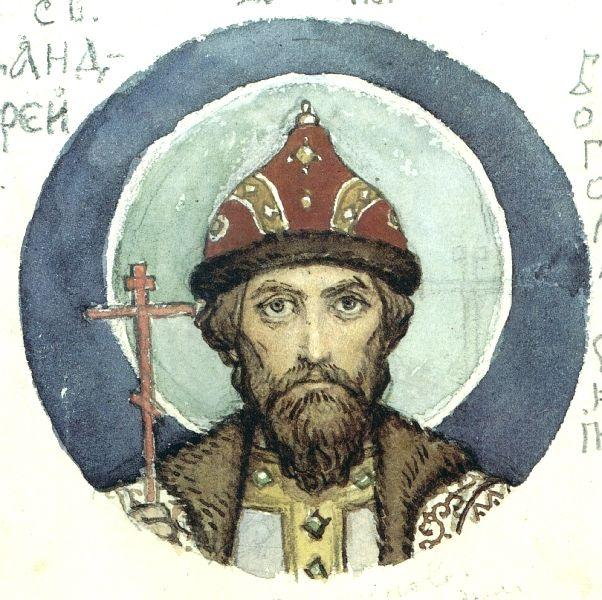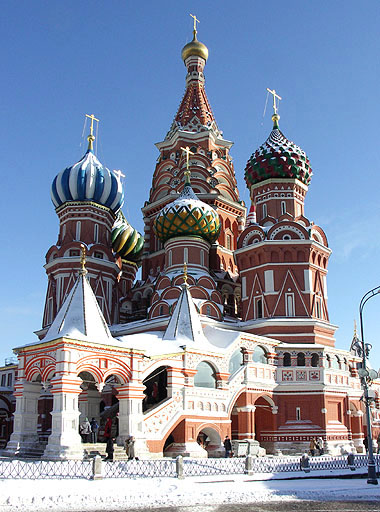|
Sergei Kirillov
Sergei Alekseevich Kirillov (1960 in Moscow, Soviet Union) is a leading modern Russian artist, who is focusing on historical paintings. His subjects have included Dmitry Mikhailovich Bobrok, Stepan Razin, Princess Olga, Ivan the Terrible, Saint Sergius of Radonezh, and Dmitry Donskoy. Education and work In 1984 he graduated from The Surikov Art Institute in Moscow, from the studio of Professor Dmitry Konstantinovich Mochalsky. His graduate work was depicting Peter the Great. His paintings are now regularly published in history classroom books, monographs of The History of Russia, and historical belletristic literature. Since 1987, 24 exhibitions of his paintings have been held in Moscow and other cities in Russia. Holdings by museums His works are in the State Tretyakov Gallery, and the art museums of Pereslavl, Bryansk, Alexandrov, and other towns in Russia. File:Kirillov knyaginya olga.jpg, Baptism of St.Princess Olga File:Sant Basil The Prayer.jpg, Basil Fool for Chris ... [...More Info...] [...Related Items...] OR: [Wikipedia] [Google] [Baidu] |
Soviet Union
The Soviet Union,. officially the Union of Soviet Socialist Republics. (USSR),. was a transcontinental country that spanned much of Eurasia from 1922 to 1991. A flagship communist state, it was nominally a federal union of fifteen national republics; in practice, both its government and its economy were highly centralized until its final years. It was a one-party state governed by the Communist Party of the Soviet Union, with the city of Moscow serving as its capital as well as that of its largest and most populous republic: the Russian SFSR. Other major cities included Leningrad (Russian SFSR), Kiev (Ukrainian SSR), Minsk ( Byelorussian SSR), Tashkent (Uzbek SSR), Alma-Ata (Kazakh SSR), and Novosibirsk (Russian SFSR). It was the largest country in the world, covering over and spanning eleven time zones. The country's roots lay in the October Revolution of 1917, when the Bolsheviks, under the leadership of Vladimir Lenin, overthrew the Russian Provisional Government ... [...More Info...] [...Related Items...] OR: [Wikipedia] [Google] [Baidu] |
Tretyakov Gallery
The State Tretyakov Gallery (russian: Государственная Третьяковская Галерея, ''Gosudarstvennaya Tretyâkovskaya Galereya''; abbreviated ГТГ, ''GTG'') is an art gallery in Moscow, Russia, which is considered the foremost depository of Russian fine art in the world. The gallery's history starts in 1856 when the Moscow merchant Pavel Mikhailovich Tretyakov acquired works by Russian artists of his day with the aim of creating a collection, which might later grow into a museum of national art. In 1892, Tretyakov presented his already famous collection of approximately 2,000 works (1,362 paintings, 526 drawings, and 9 sculptures) to the Russian nation. The museum attracted 894,374 (visitors in 2020 (down 68 percent from 2019), due to the COVID-19 pandemic. It was 13th on the list of most-visited art museums in the world in 2020. The façade of the gallery building was designed by the painter Viktor Vasnetsov in a peculiar Russian fairy-tale style. ... [...More Info...] [...Related Items...] OR: [Wikipedia] [Google] [Baidu] |
1960 Births
Year 196 ( CXCVI) was a leap year starting on Thursday (link will display the full calendar) of the Julian calendar. At the time, it was known as the Year of the Consulship of Dexter and Messalla (or, less frequently, year 949 ''Ab urbe condita''). The denomination 196 for this year has been used since the early medieval period, when the Anno Domini calendar era became the prevalent method in Europe for naming years. Events By place Roman Empire * Emperor Septimius Severus attempts to assassinate Clodius Albinus but fails, causing Albinus to retaliate militarily. * Emperor Septimius Severus captures and sacks Byzantium; the city is rebuilt and regains its previous prosperity. * In order to assure the support of the Roman legion in Germany on his march to Rome, Clodius Albinus is declared Augustus by his army while crossing Gaul. * Hadrian's wall in Britain is partially destroyed. China * First year of the '' Jian'an era of the Chinese Han Dynasty. * Emperor Xian o ... [...More Info...] [...Related Items...] OR: [Wikipedia] [Google] [Baidu] |
Living People
Related categories * :Year of birth missing (living people) / :Year of birth unknown * :Date of birth missing (living people) / :Date of birth unknown * :Place of birth missing (living people) / :Place of birth unknown * :Year of death missing / :Year of death unknown * :Date of death missing / :Date of death unknown * :Place of death missing / :Place of death unknown * :Missing middle or first names See also * :Dead people * :Template:L, which generates this category or death years, and birth year and sort keys. : {{DEFAULTSORT:Living people 21st-century people People by status ... [...More Info...] [...Related Items...] OR: [Wikipedia] [Google] [Baidu] |
21st-century Russian Painters
The 1st century was the century spanning AD 1 ( I) through AD 100 ( C) according to the Julian calendar. It is often written as the or to distinguish it from the 1st century BC (or BCE) which preceded it. The 1st century is considered part of the Classical era, epoch, or historical period. The 1st century also saw the appearance of Christianity. During this period, Europe, North Africa and the Near East fell under increasing domination by the Roman Empire, which continued expanding, most notably conquering Britain under the emperor Claudius (AD 43). The reforms introduced by Augustus during his long reign stabilized the empire after the turmoil of the previous century's civil wars. Later in the century the Julio-Claudian dynasty, which had been founded by Augustus, came to an end with the suicide of Nero in AD 68. There followed the famous Year of Four Emperors, a brief period of civil war and instability, which was finally brought to an end by Vespasian, ninth Roman emperor ... [...More Info...] [...Related Items...] OR: [Wikipedia] [Google] [Baidu] |
Russian Male Painters
Russian(s) refers to anything related to Russia, including: *Russians (, ''russkiye''), an ethnic group of the East Slavic peoples, primarily living in Russia and neighboring countries *Rossiyane (), Russian language term for all citizens and people of Russia, regardless of ethnicity *Russophone, Russian-speaking person (, ''russkogovoryashchy'', ''russkoyazychny'') * Russian language, the most widely spoken of the Slavic languages * Russian alphabet * Russian cuisine *Russian culture *Russian studies Russian may also refer to: *Russian dressing *''The Russians'', a book by Hedrick Smith *Russian (comics), fictional Marvel Comics supervillain from ''The Punisher'' series *Russian (solitaire), a card game * "Russians" (song), from the album ''The Dream of the Blue Turtles'' by Sting *"Russian", from the album ''Tubular Bells 2003'' by Mike Oldfield *"Russian", from the album '' '' by Caravan Palace * Nik Russian, the perpetrator of a con committed in 2002 *The South African name fo ... [...More Info...] [...Related Items...] OR: [Wikipedia] [Google] [Baidu] |
Andrey Bogolyubskiy
Andrew I (died 28 June 1174), his Russian name in full, Andrey Yuryevich Bogolyubsky "Andrew made Vladimir the centre of the grand principality and placed a series of his relatives on the now secondary princely throne of Kiev. Later he also compelled Novgorod to accept a prince of his choice. In governing his realm, Andrew not only demanded that the subordinate princes obey him but also tried to reduce the traditional political powers of the boyars (i.e., the upper nobility) within his hereditary lands. In response, his embittered courtiers formed a conspiracy and killed him." (russian: Андрей Ю́рьевич Боголюбский, lit. Andrey Yuryevich of Bogolyubovo), was Grand prince of Vladimir-Suzdal from 1157 until his death. Andrey accompanied Yuri I Vladimirovich (Yury Dolgoruky), his father, on a conquest of Kiev, then led the devastation of the same city in 1169, and oversaw the elevation of Vladimir as the new capital of northeastern Rus'. He was canonized ... [...More Info...] [...Related Items...] OR: [Wikipedia] [Google] [Baidu] |
Sergius Of Radonezh
Sergius of Radonezh (russian: Се́ргий Ра́донежский, ''Sergii Radonezhsky''; 14 May 1314 – 25 September 1392), also known as Sergiy Radonezhsky, Serge of Radonezh and Sergius of Moscow, was a spiritual leader and monastic reformer of medieval Russia. Together with Seraphim of Sarov, he is one of the Russian Orthodox Church's most highly venerated saints. Early life The date of his birth is unclear: it could be 1314, 1319, or 1322. His medieval biography states that he was born to Kiril and Maria, a boyar family, near Rostov (Yaroslavl Oblast), on the spot where now stands. The narrative of Epiphanius does not specify the exact birthplace of the monk, stating only that before the migration from Rostov principality the monk's family lived "in a village in the area, which is within the Rostov principality, not very close to the city of Rostov". It is considered that it is the village Varnitsa (russian: Варница) near Rostov. Sergius received the baptisma ... [...More Info...] [...Related Items...] OR: [Wikipedia] [Google] [Baidu] |
Basil Fool For Christ
Basil the Blessed (known also as Basil, fool for Christ; Basil, Wonderworker of Moscow; or Blessed Basil of Moscow, fool for Christ russian: Василий Блаженный, Vasily Blazhenny) is a Russian Orthodox saint of the type known as ''yurodivy'' or "holy fool". Life He was born to serfs in December 1468 at the portico of the Epiphany Cathedral at Yelokhovo (now in Moscow). His father was named Jacob and his mother Anna. Originally an apprentice shoemaker, he went to Moscow when he was sixteen. There he helped those who were ashamed to ask for alms, but were in need of help. He adopted an eccentric lifestyle of shoplifting and giving to the poor to shame the miserly and help those in need. He went naked and weighed himself down with chains. He rebuked Ivan the Terrible for not paying attention in church. Basil was said to have the gift of prophecy. When he died on August 2, 1552 or 1557, St. Macarius, Metropolitan of Moscow, served his funeral with many clergy. He ... [...More Info...] [...Related Items...] OR: [Wikipedia] [Google] [Baidu] |
History Of Russia
The history of Russia begins with the histories of the East Slavs. The traditional start-date of specifically Russian history is the establishment of the Rus' people, Rus' state in the north in 862, ruled by Varangians. Staraya Ladoga and Veliky Novgorod, Novgorod became the first major cities of the new union of immigrants from Scandinavia with the Slavs and Finnic peoples, Finns. In 882, Prince Oleg of Novgorod seized Kiev, thereby uniting the northern and southern lands of the Eastern Slavs under one authority, moving the governance center to Kiev by the end of the 10th century, and maintaining northern and southern parts with significant autonomy from each other. The state Christianization of Kievan Rus', adopted Christianity from the Byzantine Empire in 988, beginning the synthesis of Byzantine Empire, Byzantine and Slavs, Slavic cultures that defined Russia, Russian culture for the next millennium. Kievan Rus' ultimately disintegrated as a state due to the Mongol invasion ... [...More Info...] [...Related Items...] OR: [Wikipedia] [Google] [Baidu] |
Moscow
Moscow ( , US chiefly ; rus, links=no, Москва, r=Moskva, p=mɐskˈva, a=Москва.ogg) is the capital and largest city of Russia. The city stands on the Moskva River in Central Russia, with a population estimated at 13.0 million residents within the city limits, over 17 million residents in the urban area, and over 21.5 million residents in the metropolitan area. The city covers an area of , while the urban area covers , and the metropolitan area covers over . Moscow is among the world's largest cities; being the most populous city entirely in Europe, the largest urban and metropolitan area in Europe, and the largest city by land area on the European continent. First documented in 1147, Moscow grew to become a prosperous and powerful city that served as the capital of the Grand Duchy that bears its name. When the Grand Duchy of Moscow evolved into the Tsardom of Russia, Moscow remained the political and economic center for most of the Tsardom's history. When th ... [...More Info...] [...Related Items...] OR: [Wikipedia] [Google] [Baidu] |





